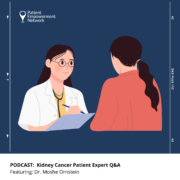Why Should Breast Cancer Patients Engage in Care Decisions?
Why Should Breast Cancer Patients Engage in Care Decisions? from Patient Empowerment Network on Vimeo.
What role should breast cancer patients play in their care and treatment decisions? Expert Dr. Jame Abraham explains the concept of shared decision-making and stresses the importance of patient/healthcare team communication.
Dr. Jame Abraham is the chairman of the Department of Hematology & Medical Oncology at Cleveland Clinic and professor of medicine at Cleveland Clinic Lerner College of Medicine. Learn more about Dr. Abraham.
See More from Thrive Breast Cancer
Related Resources:

|

|

|
Transcript:
Katherine:
Dr. Abraham, what is shared decision-making?
Dr. Abraham:
Yeah. So, that’s a really good question. When, as you know, when somebody’s ill, doesn’t matter what the condition is, patients have the biggest stake in that. It’s my health, or it’s the patient’s health. So, it’s really important for us to, patient to be aware, and empowered, in the decision-making.
So, it’s an informed process, an empowered process, for the patient to be part of the decision-making, understanding the risks and benefit of the treatment steps. And when I said treatment, it can start from screening, the procedures, to treatment, any of the things that we do, that should be an informed, shared decision-making.
Katherine:
Dr. Abraham, why is it so important for patients speak up about any treatment side effects or symptoms they may be experiencing?
Dr. Abraham:
So, as I said, they have the biggest stake in this thing, and it’s really important for them to speak up, ask questions, to the doctors. And that’s the only way we can make sure that the patient is getting the right treatment, right dose, if you need to modify, if you need to look for something else. That’s the only way, when we have that, if I can say, that trusting relationship, with proper communication, we can make sure that they – ensure they continue to get the right treatment.










